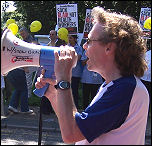WORKERS AT Whipps Cross hospital in east London have won an
important battle. They have scored a victory against the privatisers and
the service-cutters and shown that organisation and struggle can win.
Their victory is an inspiration to anyone who wants to defend and
rebuild the NHS.
The low-paid ancillary workers have shown that persistence and
determination can win victories.
They have forced the end of the "two-tier" workforce at the
hospital, where workers, employed by Initial in a privatised service
were being paid less than NHS and ex-NHS workers. And they have fought
for their rights in the NHS ‘Agenda for Change’ job evaluation and
regrading scheme.
Len Hockey, Socialist Party member and joint branch secretary of
Whipps Cross UNISON spoke to the socialist about the victory.
 "WE
"WE
HAD a mass meeting on 6 October of the Initial members at Whipps Cross –
porters, domestics and switchboard staff. We put an agreement to them
and they voted to accept it.
Len Hockey
This means that they’ll now have pay increases from £5.52 per hour up
to £7.47, including London Weighting. They’ll now have sick pay from 1
October, where previously they had little or no rights to sick pay.
They’ll all have increased annual leave. Some are on as little as 20
days, that will now rise to a new minimum of 27. And those who work in
excess of 37 hours a week will have a 37.5-hour week without of loss of
pay.
In addition to that we’ve secured a £750 lump sum payment to reflect
part of the Agenda for Change ‘higher cost area supplement’ for the
period April to October.
 This
This
is all linked to the deal which we won in 2003, which the employers
reneged on and which should have been delivered on 1 April this year. We
were forced to take eight days strike action this summer, so winning
this and ending the two-tier workforce has been a considerable
achievement.
The same group of workers have been involved in three rounds of
industrial action within ten years, here at Whipps Cross. We had a
strike in 1997 to put down a marker when we were being privatised. 2003
saw the strike to end the two-tier workforce and secured the original
agreement and we’ve had to strike in 2006 to get it implemented.
So it shows when you organise you can win – even when the odds are
stacked against you – with workers whose position in British society
isn’t very good to start with and whose confidence in English language
and literacy is low.
This battle has also been in the context of a cost-cutting exercise
implemented by government and the hospital trust. So I do think it’s a
significant dispute and a significant victory.
The workers are pleased of course, it couldn’t come quick enough.
They’re anxious to see the money in their pay packets. People have lost
a lot of earnings by striking but we’ve got a hardship fund of £26,000
which will be distributed soon.
I’d say to any group of workers facing a similar situation: "Get
organised give it your best shot."
Of course now we have to fight against the running down of the
services at Whipps Cross altogether, which seems increasingly likely. So
now we’ve got another battle on our hands."
- Len Hockey will be speaking at the
opening rally at Socialism 2006 on 25 November. He will also
be speaking on the rally on the NHS on 26 November.








